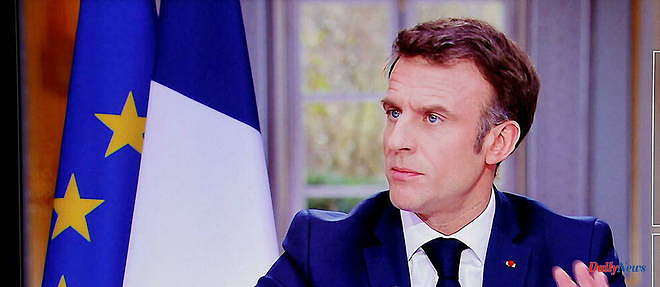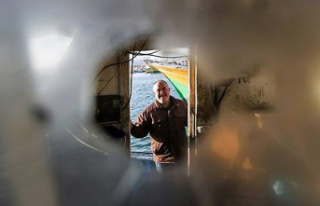Emmanuel Macron assumes and projects himself. The Head of State spoke for the first time this Wednesday, March 22 since the adoption of his pension reform by 49.3 in the National Assembly, in the 13 Hours of TF1 and France 2. While demonstrations sometimes enamelled with violence have been repeated every evening since Thursday and on the eve of a new day of mobilization, the tenant of the Élysée reaffirmed that the reform was "necessary" and would not be withdrawn.
It was urgent to appease, in a social climate on the verge of explosion and after remarks made on Tuesday in front of majority deputies who rather participated in adding fuel to the fire. Emmanuel Macron answered point by point without conceding error, preferring to project himself into the rest of his five-year term. What to remember from the interview.
The text "will continue on its democratic path", reaffirmed the Head of State, while a new day of mobilization will take place this Thursday, March 23. And to mention again the "consultation in Parliament" and the "175 hours of debate" around this text, which has never been put to the vote in the National Assembly, Elisabeth Borne having used 49.3 to do so adopt. The president recalls that the motion of censure, which could have overthrown the government and led to the rejection of the text, "failed".
Emmanuel Macron is keen, despite the challenge, to promulgate the text by the end of the year – the date of September 1 is that provided for by the reform – subject to the decision of the Constitutional Council. He reiterated that the reform was "necessary" and that he was "not happy" to carry it. “But there are no 36 solutions if you want the diet to be balanced. […] If unpopularity has to be endorsed, I will endorse it. »
"[The Prime Minister] has my confidence to lead this government team," said Emmanuel Macron. "She wanted to hold her government accountable, it's a very solemn gesture. She took responsibility. »
The Élysée had already made it known that the president was not considering any reshuffle or dissolution after the motion of censure rejected by nine votes. "It has been shown that there was no alternative majority", hammered the head of state, who gave Elisabeth Borne a mandate to "expand this majority as much as possible", on the right as on the left and "on the side of ecology". A majority to be built "text by text", with "individualities" and not parties, which he had already advocated at the start of his second five-year term. "Lucid", Emmanuel Macron acknowledges that this "has not been done" so far.
Asked about his controversial remarks made on Tuesday evening - "the crowd has no legitimacy in the face of the people who express themselves sovereignly through their elected officials" - Emmanuel Macron recalled having "said that in front of parliamentarians who suffered unacceptable attacks ". "When groups try to use extreme violence to attack elected officials of the Republic [...] because they are not happy with something, then it is no longer the Republic", he believes, taking on "clarifying words".
If the president wants to "condemn" the violence and "lift" the blockages, he assured to "respect" the legitimacy of the unions and the demonstrations. While slipping that "these challenges, with each pension reform, we have them".
Conceding a "very difficult" reform to carry out, the Head of State mocked the oppositions who would not propose anything "except withdraw the reform". "We don't compete on the sense of responsibility. "And then tackle the unions, notably targeting Laurent Berger, who refused to postpone the retirement age to 64: "I regret that no union force has offered a compromise. »
Emmanuel Macron believes that the anger expressed in the streets in recent days is not only aimed at pension reform, but that it is a "protest on work" and covers "a feeling of injustice". Recognizing that he is asking for "efforts" with the reform, he wants to tackle the relationship to work, upset according to him since the Covid-19 pandemic.
He says he wants to initiate discussions with the social partners on professional wear and tear and end-of-career retraining. The government will also work on a mechanism aimed at companies that are making a lot of profits in this period so that they "distribute more to their employees" and participate in the collective effort. The Head of State also wants to open the construction site of branch wage minimums.
The president said he wanted "fewer pieces of legislation", which would also be "shorter and clearer". The immigration bill, which was due to arrive in the Senate in the coming days, is postponed to "the next few weeks" and will eventually be the subject of several texts.
The Elysée tenant sketched out the rest of his mandate, indicating that he was aiming for full employment and a carbon-free industry, wanting to put more gendarmes and judges... Not to mention "progress for better living", at school, against medical deserts, in matters of ecology. A water plan will be presented in the coming weeks: "We must win the battle for water sobriety [and] all do a little bit of effort. »
"We have no right to immobility", hammered Emmanuel Macron. A change of method for the rest of the quinquennium? “We must appease, rebuild a parliamentary agenda and reforms. And to welcome the texts already voted on since last April despite the relative majority in the Assembly, a sign that the "co-construction" would already work. The president concedes only one regret, "that of not having succeeded in convincing" of the merits of the reform. He wants his government to be "more engaged on the ground".
Consult our file: Pensions: the big bang












